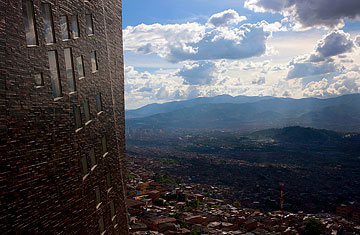
Colombian renaissance A new, ultramodern library in the low-income area of Santo Domingo overlooks Medellín
Juan Manuel Santos, a leader known for a shrewd sense of political timing, is checking his watch as he sits down with TIME journalists at the Casa de Nariño palace in Bogotá. Colombia's President isn't being rude; it's just that any minute now, 250 km to the south, Marxist guerrillas will release their last 10 military and police hostages. Santos knows the images — like the stirring picture of army sergeant Luis Alfredo Moreno, wrapped in a Colombian flag and pumping his fist skyward after being held 14 years in the jungle — will speak more powerfully than he can about the hopeful new course Colombia is taking. "This," Santos tells his guests, "is a happy coincidence."
More than that, Santos is convinced that this is Colombia's hour. For the past 48 years, the government has been locked in a bloody conflict with the Colombian Revolutionary Armed Forces, known as the FARC, a guerrilla insurgency fueled by drug trafficking and kidnapping ransoms. The FARC's April 2 hostage release, part of an effort to initiate peace talks, was just the symbolism Santos needed before he hosts U.S. President Barack Obama and 31 other western-hemisphere heads of state at the Summit of the Americas in the Caribbean city of Cartagena on April 14 and 15. Like Moreno, Colombia and its 47 million people are emerging from a long, dark night of violence and isolation into what Santos tells TIME is a "changed reality completely out of anyone's imagination." Not just a recovered nation, he insists, but the new economic and diplomatic player on the Latin American calle, or street.
That claim might reflect Santos' outsize confidence more than it does reality, especially since many of Colombia's outsize problems — not just the guerrilla war but also the epic wealth disparities and human-rights abuses that originally provoked the rebels to take up arms — still loom like the country's 15 active volcanoes. "As positive as we feel, we don't know yet if Santos can really neutralize the many mafias that try to run this country," says Gerardo Vega, head of the human-rights NGO Forjando Futuros (Forging Futures). Colombia is the U.S.'s closest ally in South America, but it still wrestles with every sinister stereotype on the continent: left-wing guerrillas and right-wing militias, murderous drug lords and brutal feudal lords, intractable poverty and corruptible politicians. Hollywood, especially crime shows like CSI: Miami, keeps looking to Colombia as a go-to source of exotic foul play.
Even so, the center-right Santos, who after 20 months as President enjoys an approval rating close to 80%, can legitimately declare Colombia the region's comeback kid. In the past decade, a revived military, which he led as Defense Minister from 2006 to '09, has decapitated the FARC's leadership and reduced the rebels' ranks from almost 20,000 to 8,000 today. The infamous drug-trafficking cartels that once strangled cities like Medellín — which 20 years ago had a murder rate almost twice that of the world's new homicide capital, Juárez, Mexico — have been dismantled, thanks largely to police and judicial modernization that narco-plagued neighbors in Central America now look to as a model. The equally terrifying scourge of criminal and rebel kidnappings has dropped from 3,572 in 2000 to fewer than 300 last year.
Foreign direct investment has risen almost tenfold since 2003, to $13.2 billion in 2011. While the economy grew a robust 6% last year — it is now South America's third largest and is closing in on Argentina at No. 2 — the country secured a free-trade agreement with the U.S. and may soon be pumping a million barrels of oil per day. At the same time, Santos has pushed through land reform and human-rights laws, directing aid to the 4 million citizens displaced by half a century of mayhem in the neglected provinces. "We were for many decades signaled as a nonviable state," Santos admits to TIME. "But what I know is that when you ask people in the U.S., Europe and Japan today if they think their kids will have a better future, they say no. In Colombia they're saying yes."
The Region's New Leader?
Santos, 60, whose regional leadership ambitions are as hard to miss as the myriad emerald shops in downtown Bogotá, complements that domestic optimism with a more assertive foreign policy. His popular right-wing predecessor, Alvaro Uribe, "didn't really care what the rest of the world thought of him," says Michael Shifter, president of the Inter-American Dialogue in Washington, D.C. "But Santos sees himself with a global constituency." Indeed, now that former Brazilian President Luiz Inácio Lula da Silva has left office, the question is whether any other Latin American leader besides Santos is filling the role of regional standard bearer. Lula's successor, Dilma Rousseff, can perhaps make a claim. But Venezuelan President Hugo Chávez's firebrand cachet had shrunk well before he began fighting cancer last year; Argentine President Cristina Fernández seems intent on spending her diplomatic capital on a row with Britain over the Malvinas (Falkland) Islands; and Mexico's drug-war crisis has made it a shadow of the hemispheric agent it once was.
